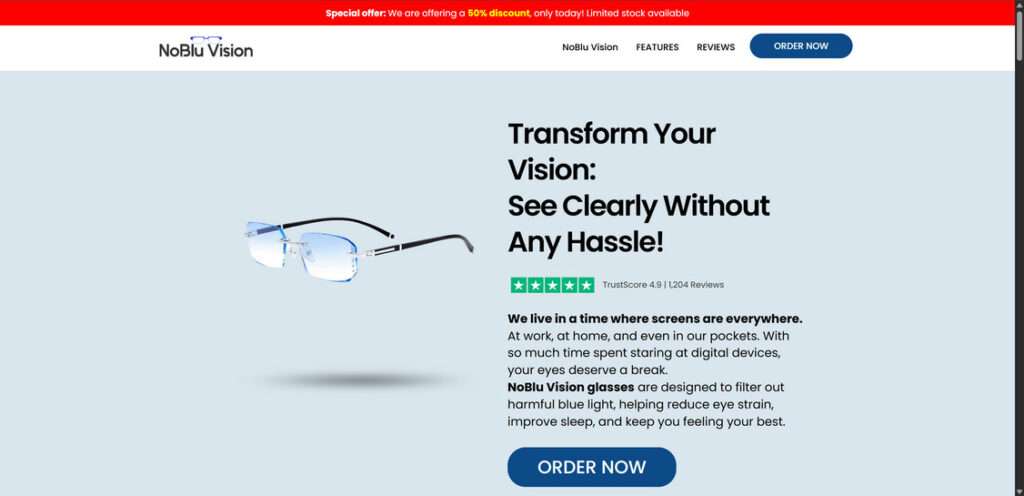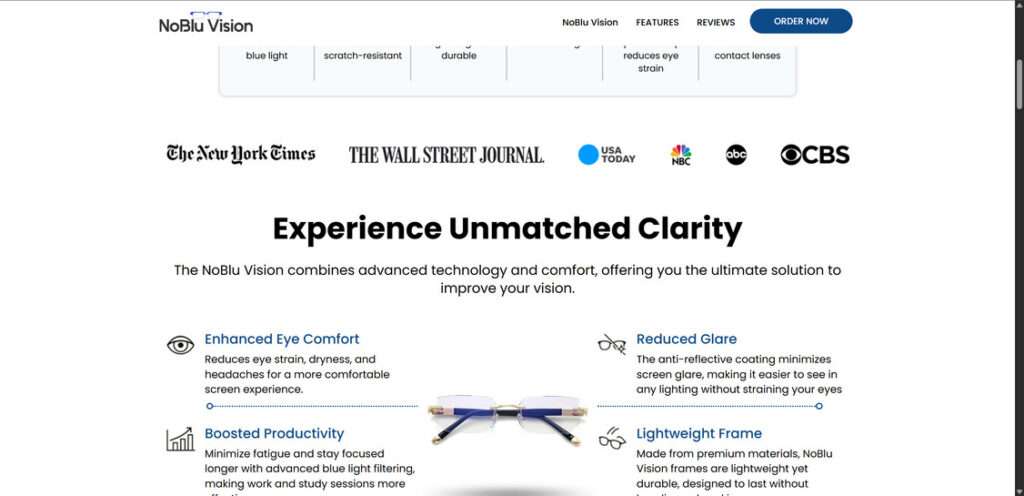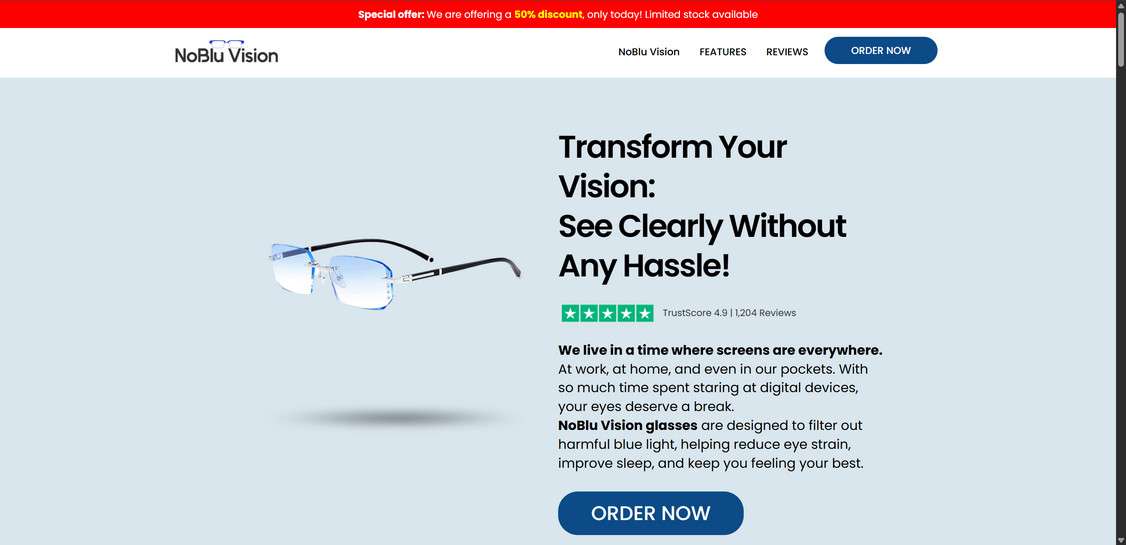In a world dominated by digital screens, it’s no surprise that products claiming to protect our eyes from harmful blue light are gaining popularity. One such product is the NoBlu Vision Glasses. Marketed as a high-tech solution for digital eye strain, these glasses have exploded across social media with glowing endorsements, bold health claims, and urgent calls to action.
But are these glasses truly the eye-saving innovation they claim to be, or just another example of clever marketing masking a cheap, resold product? In this in-depth exposé, we break down what NoBlu Vision is, investigate its legitimacy, and reveal what customers are really getting for their money.

What Is NoBlu Vision?
NoBlu Vision glasses are advertised as blue light blocking eyewear designed to relieve eye strain, improve sleep quality, and boost overall comfort during screen time. The promotional content claims they block up to 73% of harmful blue light, reduce dry eyes by 47%, and help users fall asleep faster.
Key Marketing Claims
- Filters harmful blue light
- Reduces eye strain, dryness, and headaches
- Improves sleep by preserving melatonin levels
- Scratch-resistant and anti-reflective lenses
- Lightweight, unisex design
- Suitable for use with contact lenses
- “Endorsed by doctors” and featured in major news outlets
These features are wrapped in slick branding and aggressive marketing strategies, including limited-time offers, countdown timers, and a seemingly endless stream of five-star reviews.
Red Flags and Questionable Tactics
1. Fake Endorsements and “As Seen In” Logos
NoBlu Vision’s website prominently features logos of The New York Times, The Wall Street Journal, NBC, USA Today, and other major outlets, implying media coverage. However, there is no evidence these publications have ever mentioned or reviewed NoBlu Vision.
This tactic is common in dropshipping scams, where generic products are dressed up with fake authority to build trust with consumers.

2. Fabricated Reviews and Ratings
The site claims a TrustScore of 4.9 based on 1,204 reviews, but only one real review is visible—and it’s a negative one. The rest appear to be either generic placeholders or fabricated testimonials. This discrepancy raises serious doubts about the authenticity of user feedback.
Many consumers report that their posted reviews never appeared on the site, especially if they were critical.
3. Untraceable “Doctors” and Testimonials
A so-called expert named Dr. Peterson claims to wear and recommend NoBlu Vision glasses. However, there is no verifiable record of this person being a licensed optometrist. The image used for Dr. Peterson appears to be a stock photo.
This is another hallmark of deceptive e-commerce—using fake medical endorsements to lend false credibility to the product.
The Truth About the Product
1. It’s a Generic Dropshipping Product
Upon further inspection, NoBlu Vision glasses appear to be generic eyewear sourced from Chinese suppliers, available for as little as $2 to $5 on wholesale platforms like Alibaba and AliExpress. These same designs have been rebranded and resold under various names using identical website templates and marketing copy.
Consumers are essentially paying up to $80 for a $5 product, repackaged with exaggerated promises and fake testimonials.
2. Not Medical-Grade or Certified
Despite its lofty claims, there is no FDA approval, CE certification, or third-party testing to verify the glasses’ effectiveness in filtering blue light. The website also fails to provide technical specs or scientific data to support its advertised benefits.
This omission is particularly troubling for a product that claims to impact eye health and sleep quality.
3. No Prescription Options
Unlike reputable eyewear brands, NoBlu Vision does not offer diopter strength options or a way to customize the glasses to your prescription. This means the glasses are essentially one-size-fits-all, which is inadequate for users with specific visual needs.
Many users expecting vision correction have found themselves disappointed when the glasses do not improve their eyesight as claimed.
User Experiences and Complaints
1. Product Quality Issues
Dozens of customers have reported that the glasses feel cheap, flimsy, and poorly made. Common complaints include:
- Easily scratched lenses
- Loose hinges
- Weak or missing anti-glare coating
- No noticeable difference in screen comfort or sleep
2. Non-Responsive Customer Service
Customer support for NoBlu Vision is almost non-existent. Emails go unanswered, return requests are ignored, and the advertised “30-Day Money-Back Guarantee” is rarely honored.
Many users report being stuck with a subpar product and no way to get a refund.
3. Shipping Delays and Disguised Origins
While the website claims fast shipping, in reality, many buyers wait 2 to 4 weeks for delivery. The packages often ship directly from China, contradicting the site’s claims of local fulfillment.
Familiar Website Template, Familiar Dropshipping Operations
NoBlu Vision’s website design and marketing style are eerily similar to other known dropshipping operations that have sold everything from posture correctors to miracle pillows.
The structure is formulaic:
- Large hero image with a countdown timer
- Fake media logos
- Dubious medical testimonials
- Inflated discount pricing
- Pushy “limited-time offer” messages
- Fake scarcity (“Only 6 left in stock!”)
This is a classic script for manipulating impulse buyers into purchasing before researching the product.
Who Is Behind NoBlu Vision?
Unsurprisingly, there’s no publicly disclosed owner. Domain records are masked, and there’s no corporate registration info.
Most likely, this is run by a dropshipping operation overseas (commonly in China), leveraging anonymous digital storefronts to make fast profits and disappear before refund claims mount.
Final Thoughts: Avoid the Trap
At a glance, NoBlu Vision may seem like a smart, affordable solution to digital eye strain. But behind the flashy marketing lies a deeply problematic operation built on fake endorsements, deceptive pricing, and empty promises.
You deserve better than a $5 pair of glasses marked up to $40 under a fake “doctor’s recommendation.”
If you care about your eyes, your money, and your trust, avoid NoBlu Vision — and tell your friends too.
Frequently Asked Questions (FAQ)
Q: Are NoBlu Vision glasses legit?
NoBlu Vision glasses are not considered a legitimate or trustworthy product. The company uses misleading marketing tactics, fake customer reviews, and unverifiable claims to promote a low-quality product at a highly inflated price. Most users report that the glasses do not perform as advertised.
Q: Do NoBlu Vision glasses really block blue light?
There is no scientific data, third-party testing, or certification provided to support the blue light blocking claims. Without verified proof, there is no way to confirm that the glasses effectively filter harmful blue light.
Q: Why do NoBlu Vision glasses have so many 5-star reviews?
The large number of 5-star reviews displayed on the NoBlu Vision website appear to be fake or fabricated. Independent review platforms and forums reveal that actual customer experiences are overwhelmingly negative, with many claiming the reviews are dishonest or artificially generated.
Q: Is NoBlu Vision a dropshipping business?
Yes. NoBlu Vision fits the common dropshipping model. The product is cheaply sourced from overseas manufacturers and sold at a high markup through a generic website that uses recycled templates and misleading branding. This approach prioritizes profit over quality or customer satisfaction.
Q: Can I get a refund from NoBlu Vision?
Although the website advertises a 30-day money-back guarantee, many customers report that refund requests are ignored or denied. The refund policy is inconsistently enforced, and the company provides little to no customer support after a sale is made.
Q: Is it safe to order from NoBlu Vision’s website?
While the site may use secure checkout software, ordering from NoBlu Vision carries significant risk. Customers frequently receive a product that does not match the advertised quality, and the lack of transparent customer support or a clear return process makes the purchase risky.
Q: Are there better alternatives to NoBlu Vision?
Yes. Trusted blue light glasses brands such as Felix Gray, Gunnar Optiks, and Warby Parker offer tested and reliable products. These companies provide verified protection, prescription options, and strong customer service.
Q: Why does NoBlu Vision show logos from The New York Times and NBC?
These logos are used without permission to create a false sense of credibility. There is no documented evidence that NoBlu Vision has been reviewed, endorsed, or featured by any of the media outlets displayed on their site.
Q: What should I do if I already ordered from NoBlu Vision?
If you have already placed an order, consider taking the following steps:
- Contact your bank or credit card provider to request a chargeback.
- Save all email communication and receipts for documentation.
- Report the company to consumer protection agencies such as the FTC, BBB, or ScamPulse.
- Leave honest reviews on public platforms to warn others.
Let me know if you’d like this integrated into the full article or exported for publishing.



![Remove Actoniumbaryten.com Pop-up Ads [Virus Removal Guide] 11 McAfee scam 4](https://malwaretips.com/blogs/wp-content/uploads/2023/08/McAfee-scam-4-290x290.jpg)
I cannot find a site for a refund of two NoBlu Vision Glasses. Everything you stated about cheap, unusable and not as stated is true. What a scam especially for those of us hoping for our fading vision to improve.
Nora, unfortunately this is very common with these “vision glasses” sites: little to no real support, and returns that are expensive or impossible.
Best next steps:
If you paid by card or PayPal, open a dispute as not as described / misleading advertising.
Save screenshots of the product page and claims, plus your order confirmation and any emails.
If they keep charging or you’re seeing additional attempts, ask your bank about blocking future charges from the merchant.